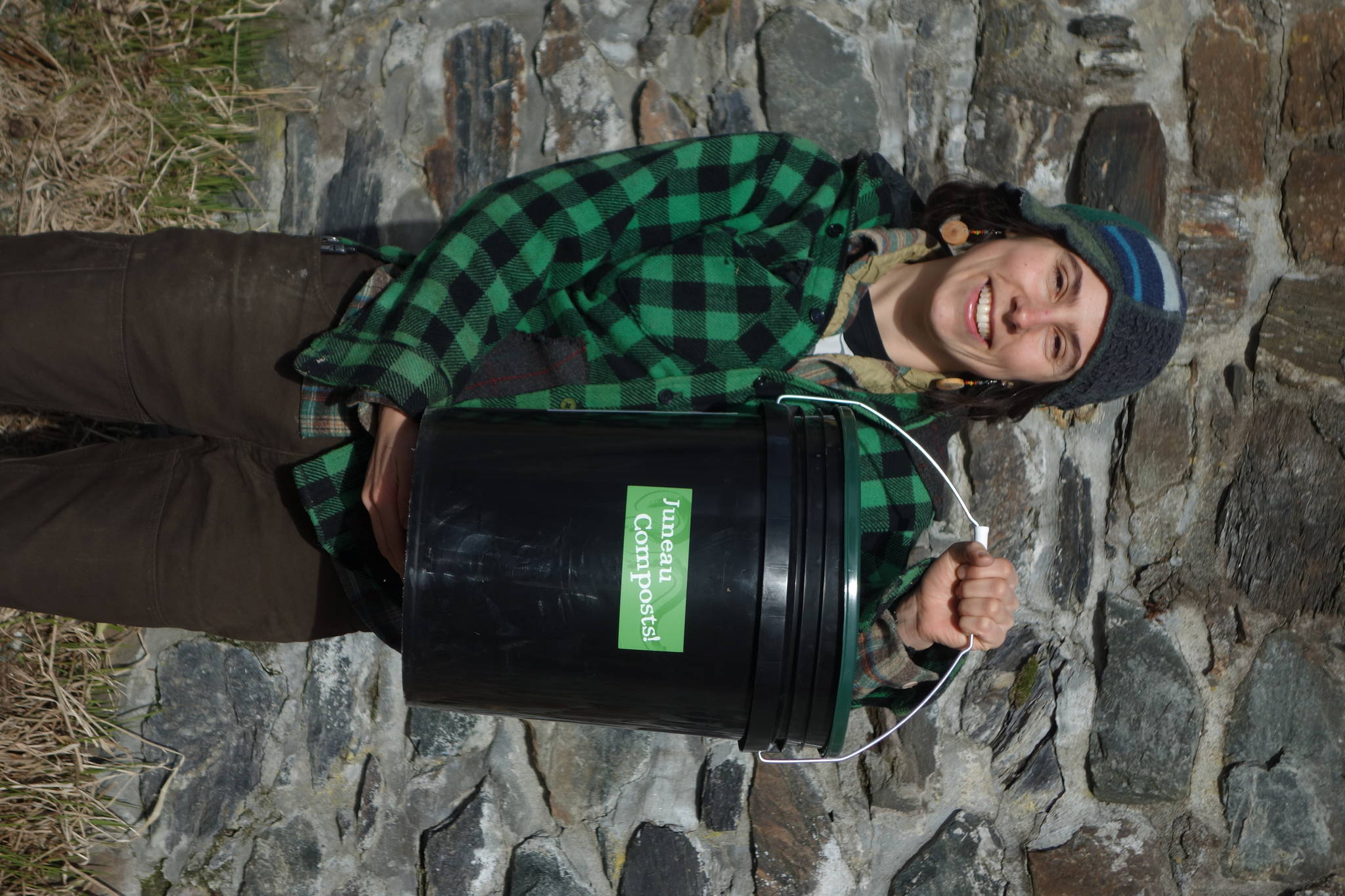Instead of having biodegradable materials fill up the city’s landfill, Lisa Daugherty wants to take Juneau’s would-be-waste and turn it into something useful — so she’s created a business, Juneau Composts, to do it. Just from the posters she put up around town a couple weeks ago, a half dozen people have signed up.
“The local food movement is sweeping across the country, and composting is a vital part of that nutrient cycle. If we harvest nutrients from the soil in the form of fruits and vegetables, then bury their waste in methane-producing landfills, we are really getting in the way of sustainable agriculture. It’s easy to lash out at companies like Monsanto, but it’s even easier to take charge of our own actions and compost. Basically, if people care about where their food comes from, they should also care about where it goes. They should also care about where their garden’s fertilizer comes from,” Daugherty said.
Composting is when a mixture of organic, carbon-based material is allowed to decompose naturally, typically in a pile or bin, through the action of microorganisms; through this act of recycling, the resulting product can be used as a fertilizer for soil enrichment in gardening.
“I think it’s really timely right now with everything that is going on in the government. People are a little worried about the environmental future and composting can really help alleviate even global problems … There’s a lot of bigger scale pictures that scraping your plate really affects,” she said.
Daugherty had the initial idea for this business back in 2011. In 2012, she put it into action with a pilot project for the volunteer component of her Master Gardeners class through the Cooperative Extension Service. She wanted to prove that hot composting could be done in Juneau year round.
“I hot compost, which means it heats up to 160 degrees,” she said. “All that has nothing to do with sunshine or adding powders, which some people do. If you have the right mix of materials, naturally organisms are just going to be there and they are going to eat and reproduce and all that makes energy as heat.”
She confirmed that she could successfully hot compost in Juneau from her pilot project. All she needed is the right recipes to mix the organic material and balance the ratio of nitrogen to carbon, as well as the space and time to do it. She took the biodegradable material from 20 residential houses and six businesses for a full year and tracked her data. She found that on average 2.6 cubic yards of materials came out to one cubic yard of compost. She also found that those who participated caught on quickly. Setting aside biodegradables for Daugherty to pick up became a new normal for them.
“I think that’s one thing that Juneau is kind of lacking when compared to composting in the U.S. as a whole. Dumping your trash is really easy here. In other places it’s really expensive or you have restrictions or composting is mandatory … That’s kind of a challenge Juneau and Alaska in general has; it doesn’t have as (many) people so if we throw stuff out it’s kind of meh, it’s in the dump, it’s no big deal. But I see little things change. I keep seeing little things in the paper about the city wanting to change, wanting to compost,” Daugherty said.
Daugherty didn’t see why she couldn’t be the one to bring composting to Juneau. To turn the whole project into a full-fledged business seemed doable, so just three months ago, she set to planning her business launch. Instead of composting in her yard like she did during the project, she now has a six-acre lot in town set aside for this sole purpose.
For residential areas, she plans to come by once a week and pick up participants’ five gallon bucket of compost from the curb like a garbage man would a trashcan. For businesses, pickup times are dependent on need. When she assesses a business, she takes a look at its current disposal methods and what they’re throwing out to set up an efficient system.
“It’s a flexible operation,” she said.
A portion of the finished compost can go back to the people whose waste made it for gardening purposes, or people can just choose to donate it community gardens and schools, she said.
While she is the owner and only employee of the operation at present, she said she might hire help with pickup if the demand calls for it. Becoming a big operation in town is not her goal, however. Daugherty sees composting as a social, environmental and economic opportunity; even if people do not sign up for her compost pick up service, she hopes her experience can encourage others to try it out.
“People should consider (composting) as a responsible thing to do as a human being,” she said.
For information on rates, go to juneaucomposts.com.
Contact staff writer Clara Miller at clara.miller@capweek.com.
